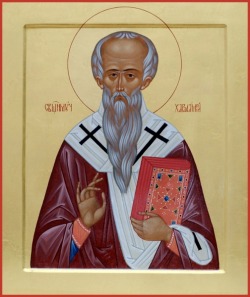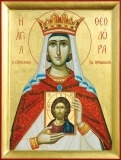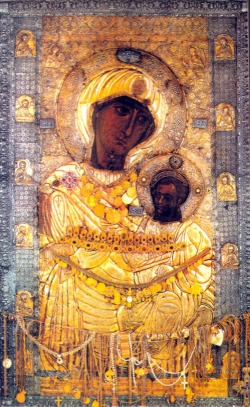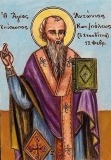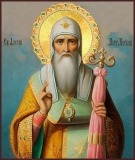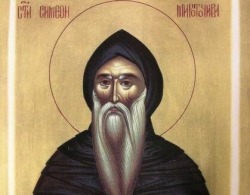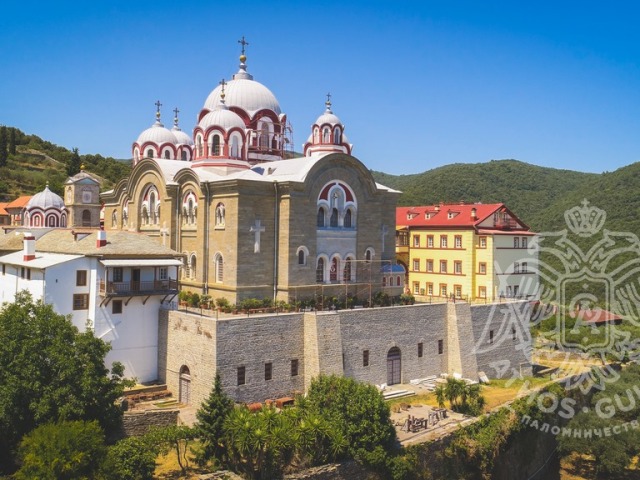Skete of Prophet Elijah Commemorations

Located in a desolate, densely vegetated area, half an hour away from the sea, the majestic skete of prophet Elijah captivates with its beauty and serenity. It suddenly appears to the traveler on the road from Karjes and astonishes with its towering domes. It gives the impression of an exotic palace that time has left untouched. A majestic guardian standing there, looking out at the sea lying before him.
A unique landscape of indescribable beauty fringes the skete, adorns and emphasizes its charm, making it even more attractive. It seems that the infinite beauty and tranquillity that reigns here turns the Prophet Elijah's skete into a spiritual airport, where one who is praying can more easily take off and fly into the sky...
The main shrines of the skete are the miraculous icons of the Mother of God "Galaktotrofousa" and "Dakrirroousa", a particle of the True Cross and part of the left foot of the Andrew the Apostle.
Please note that for commemoration at the Proskomedia you may submit ONLY the names of people who have been baptized in the Orthodox Church of the Eastern Rite. Requests for the commemoration of persons belonging to other Christian denominations (Catholicism, Protestantism, etc.), or other religions (Judaism, Islam, etc.), cannot be accepted in Orthodox monasteries.
To the Mother of God "Galaktotrofousa" (Nursing)

Believers pray to the icon of the Mother of God "Galaktotrofousa" (Nursing) for the health of newborns and their mothers. This holy image of the Mother of God is close and understandable to everyone: it embodies the tender care of the Mother for the Child, their mutual love.
The miracle of motherhood is revered in virtually every culture and religion. Certainly, in the Orthodox tradition, the main intercessor and patroness of motherhood is the Virgin Mary. To each type of icon depicting the Mother of God (for there are many), parents turn with specific requests and aspirations. In particular, the image of the Mother of God "Galaktotrofousa" gives a special blessing for the lactation of milk and the performance of other maternal functions.
What do we pray the Mother of God "Galaktotrofousa" for?
- deliverance from gynecological ailments;
- cure of infertility;
- deliverance from pregnancy difficulties;
- increase in lactation;
- easy childbirth. At the most important moment, the prayer to the "Galaktotrofousa" can help women in labor to easily resolve the pregnancy;
- healing of children from illnesses;
- deliverance from problems and difficulties in the family.
To the Mother of God "Dakrirroousa" (Theotokos of Tikhvin)

The miraculous icon of the Mother of God "Dakrirroousa" (Shedding Tears) is an exact copy of the famous ancient image of the Theotokos of Tikhvin.
The icon is considered the patroness of infants - that is why it is also called a "child's" icon. It helps in the treatment of children's illnesses, calms restless and naughty kids, helps when choosing friends, and protects children from the bad influence of the street. It is believed that the icon strengthens the bond between parents and children.
The icon also patronizes family relationships. It has been noted that if the icon of the Theotokos of Tikhvin is present in the family altar, quarrels between household members occur much less frequently. Marital love and mutual respect are revived, and children become more diligent and obedient. And singles can pray for finding a significant other.
What do we pray the Mother of God "Dakrirroousa" for?
- health of our children and their return to the right path;
- normal development of children;
- protection from bad influence;
- finding a significant other;
- making the right decision;
- deliverance from paralysis, epilepsy, gaining or restoring sight;
- deliverance from despondency when coping with problems or the loss of loved ones;
- finding the right solution in difficult situations;
- deliverance from ill-wishers and enemies;
- love and harmony in the family;
- strengthening of family ties.
Orthodox Holidays
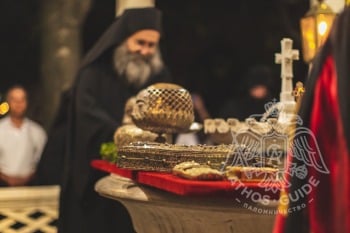
A unique opportunity to submit prayers for health or repose of your loved ones on Orthodox holidays. Such holidays may relate to events of the earthly life of Our Lord Jesus Christ and Virgin Mary, or be dedicated to the lives of saints, commemorations of particularly revered events, and holy icons.
In this section, the upcoming holidays of the Orthodox Church are displayed. Please be attentive when filling out the cards, as each of them refers to one of the upcoming Orthodox holidays.



